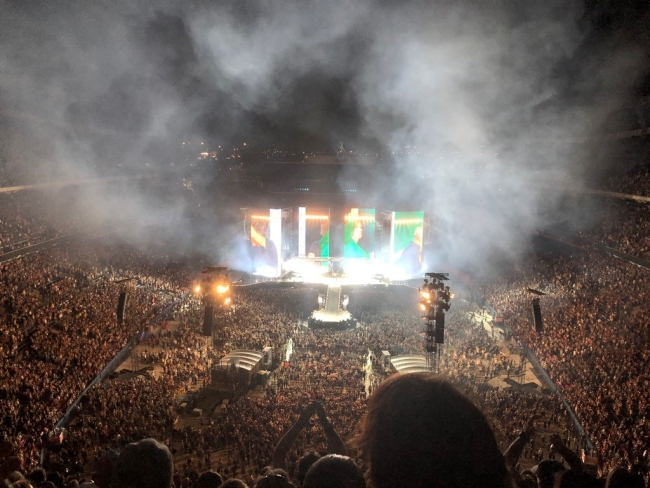You have /5 articles left.
Sign up for a free account or log in.

The Rolling Stones, Denver, August 2019
William Kuskin
Somewhat late to the party, I went to my first Rolling Stones' concert this summer. It's been on my bucket list for a while now, and I figured I better get down to the stadium while it was still possible. The concert was wonderful. The best literature professors I know teach as if encountering a poem for the first time every time -- with the looseness of discovery -- and this exactly how the Rolling Stones delivered song after song.
The third song was selected by a website vote. With a little fanfare from Charlie, Mick proclaimed "Like a Rolling Stone" the winner, and the Stones ripped into Dylan's iconic song of cultural and personal revolution. In 1965, "Like a Rolling Stone" was Dylan's conduit into rock. It wired a folk music hero for high-voltage pop-star wattage. Routed through the Rolling Stones in 2019, the song was both a celebration of old rockers in a new day and a reflection on our own times. How does it feel to be like a rolling stone? On the level of a massive community having a collective experience of renewal, it feels pretty damn good. On the level of social commentary, it is a reminder that we've returned to times of revolution, that they're fighting in the streets of Hong Kong and Portland both, and that we're in for a long electoral battle, which promises to be fought over the digital landscape as much as stadium rallies.
The revolution often feels particularly close to us readers of Inside Higher Ed. "Beware, doll, you're bound to fail," Dylan spat out in 1965, hitting pretty close to our own home: "You've went to the finest school all right, / Miss Lonely / But you know you only used to get juiced / In it / Nobody has ever taught you how to / Live on the street / But now you find out you're gonna have / To get used to it." We might take this seriously. Success is not permanent, and when you fail, when you fall, when the economy dips and students stop paying full tuition to get juiced at the finest schools, we just might feel like we are on our own indeed, with no direction home. Geoffrey Chaucer's economical definition of tragedy is simply a fall from prosperity. The stone turns, it revolves, and with revolution comes tragic change.
With Dylan and the Stones, continuity and change, in mind, I headed off to the Affordable Degrees at Scale Symposium last week. It, too, was a first for me. Joshua Kim itemized the phenomena of the "Affordable Degree at Scale" in this venue just recently ("21 Low-Cost Online Master's Degrees from Coursera and edX").
In a follow-up article, he stepped back a bit and asked if anything sets these degrees apart from affordable online master's degrees in general ("Pushing Back on My Idea That Low-Cost Online Master's Programs Are New"). I've been working on a massively scalable degree at the University of Colorado Boulder for the past few years and trying to understand this new domain -- is it correctly called MOOCs Ver. 3.0? Is it simply a variant of online education? Will it soon go away as an evolutionary dead end? -- so I was happy to jump on a plane and see what I could learn.
The symposium is still more a thinking-out-loud about a joint endeavor than an actual conference. The hosts are clear about the Chatham House Rule ("Participants are free to use the information received, but neither the identity nor the affiliation of the speaker(s), nor that of any other participant, may be revealed"), so what follows is less a conference report, than my reflection on this emerging degree gene.
The first day began with a series of questions asked by different speakers: what are scaled degrees, how do universities address the changing needs of the workforce, and most directly, given that the American university's business plan has been premised on continued growth, that it has balanced the weight of ever-increasingly personnel, plant, and research costs against a customer base that is increasingly skeptical about paying an all-in tuition, what's next?
To paraphrase Dylan pretty roughly, we probably said we'd never compromise with some mystery tramp -- some grab bag of educational services wrapped around a curriculum of workforce development, say -- but now, as we realize that there are no alibis hidden in state funding models (certainly not way up north), and we stare into the vacuum created by a fixed and dated product in a rapidly diversifying educational marketplace, we might well stop and ask, "Do you want to make a deal?"
The Symposium grappled with the stakes of this deal. In a sense, it grappled with the deal initiated in 2012, the Year of the MOOC, the moment of the Massive Open Online Course revolution. This moment has often enough been seen as a false promise, a disruption that never came. It's worth pausing over it now because it crystalized the public's dissatisfaction with higher education, most overtly with the cost of the residential degree but also with available alternatives: with the established online format for degree programs, with the for-profit university sector and with notion of ongoing education as "continuing education."
What the pundits missed in 2012 is that the impetus for change in higher education did not simply come from Silicon Valley -- and Boston-based startups. For who empowered those roguish disrupters with educational content, if not the very professors ensconced in their offices overlooking the liberal arts quad? Who signed those open-ended contracts with no business model, just the promise of disruption, if not the Provosts and Executive Vice Chancellors who rule those very quads from their highest of Ivory Towers? The universities were all-in on disruption from the start.
In my view, Udacity, edX and Coursera have not really innovated the educational product, so much as created a scalable platform, the significance of which we are only working out now. In fact, the startups have confused the basic educational products our world understands with a variety of alternatives, "micro"-this and "master"-that. They have had tremendous difficulty seeing their way through the fundamental importance of record keeping in student management to workable student enrollment tools. What they got right is that scale drives innovation.
Universities are no strangers to scale. They have been delivering campus residential lectures at scale for longer than the Rolling Stones have been performing. In my experience, however, the scale possible in the massive online environment forces a significant process of reflection on both teaching and enrollment management practices. This process of reflection fundamentally sets the affordable-degree-at-scale domain apart from other teaching and learning modalities.
Look at the Stones. The Stones created community that night and not just through established content. They held a digital vote to give the Denver concert some sense of itself, and after "Like a Rolling Stone," they set a drum kit up at the end of Mick's catwalk, picked up acoustic guitars, and dimmed the lights to devise a little folk rock club at the very end of their enormous stage for acoustical versions of "Sweet Virginia" and "Dead Flowers." In a certain way they were indeed mimicking the intimacy of a small club but only as a broad trope. Instead, they created something new at scale -- massive intimacy -- a magical inflection on the communal spirit they had created over the first three songs.
Case in point: when I teach comic books to 35 students online, I deploy the same practices that I use when I teach comics on campus to a 25-student class or a 180-student lecture. In each case, I use the same schedule, based as it is on the rotations of the agricultural calendar, and I time my sessions according to the same rotations of the clock. Throughout, I am the centering force, the interlocutor, of the class. When those students enroll, the registrar or the Continuing Education administrator uses the same practices to update the university records.
When I teach comics to 35,000 students on Coursera, I must rethink my practice, revising it so my students learn as a massive community. This forces me to break down my lectures and reorganize my content according to a new structure, an "on-demand" calendar and clock. If I seek the intimacy of humanist storytelling, I must devise an imaginative space that conjures collectivity in the digital venue. Throughout, I must realize that I am not the centering force of the internet. I am a shepherd. Learning belongs to the learner.
Further, if those 35,000 students were to seek enrollment for credit, the registrar could not use the same practices as campus enrollment but would be faced with the task of devising a new platform for enrollment management.
The medium is the message. Scale changes the fundamental nature of our endeavor. This means that as much as we might like to say that scaled degrees are the same as residential degrees -- that the truly massive Georgia Tech Computer Science is the same as its residential degree, or that the University of Illinois's Gies School of Business MBA on Coursera is the same as the residential program it supplanted -- we cannot, because their medium demands new practices for teaching and enrollment services.
Given this observation, I take three main points from the Affordable Degrees at Scale Symposium that help me understand where we are in following out the 2012 revolution, in mainlining massive electrical current into our nineteenth-century industry.
- The Period of Emergence. If 2012 signaled a moment of disruption, we are now in an extended period of emergence. The period concerns experimentation in teaching practices, but more significantly, a rethinking of the enrollment workstreams and data management systems that undergird the university. I term this a period of "emergence," because it brings together a convergence of thinking -- teaching, technology and student services -- around a new product. Our collective inability to define clearly what affordable degrees at scale really are is the mark of the incomplete but ongoing creative activity of the emergent period.
- What's Next? Recursion. At the risk of hypothecating, I will answer the question raised on the first day of the symposium: "What's next?" Over the next three years the scaled degree environment, currently far behind both of the established teaching modalities of residential and online learning, will begin to mature. What is next is a moment of recursion in which the lessons of scale return from the murky area of "affordable at scale degrees" to the residential campus. The result will be significant change in the way universities are able to do business -- a new flexibility in automation, data analytics, interdisciplinarity, curated degree collaboration, on-demand services, tuition rates -- and a shift in the relationship to third-party vendors.
- Innovation belongs to the university. I take it as a given that we are at a moment of change in higher education. I also realize that that the dream of human betterment through learning is just as strong, just as meaningful, and just as relevant in our contemporary circumstance as ever.
I turn back to Dylan. "Like a Rolling Stone," is an angry song, and its venom is personal and gendered. These qualities create an intended ugliness, I think, that drives home the unavoidable tragedy inherent in revolution. Yet, the song ends with a coming-to-grips that is ultimately liberating:
You're invisible now, you got no secrets to
Conceal,
How does it feel,
How does it feel,
To be on your own
With no direction home,
Like a complete unknown
Just like a rolling stone?
We will give up some of our established practices in the coming days. But in the honest light of truth, we know this: innovation belongs to the university.




